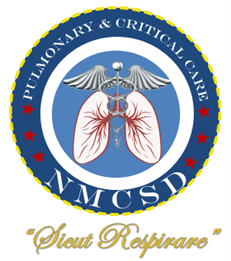- Rotation Director: Charles Volk, M.D.
- Rotation Location: Naval Medical Center San Diego
- Rotation Duration: Six 4-week blocks
- Trainees/month: Two or Three
Description of the Educational Experience:
A total of six months of dedicated research time is scheduled, spread throughout the three years of fellowship; ideally for two months during each year of training. The experience is designed in this way for logistic reasons and to facilitate the natural progression of research. In general, the first-year experience is intended for the fellow to perform background and literature searches and develop a research question and initiate work on a protocol. The second year blocks are for collation of data and refinement of the process with preparation of the presentation of results. During the third year, fellows should anticipate completing a submission of their work for presentation or publication. Third-year fellows are strongly encouraged to involve more junior trainees in on-going work to maximize the educational benefit for the entire department. With prior approval of the program director, the research experience may be divided into 3-6 month blocks if deemed academically appropriate and meaningful.
Future Pulmonary and Critical Care Specialists need to be familiar with research principles and methods. Continued progress in prevention, diagnosis, and treatment of PCCM disorders requires the elucidation of biologic mechanisms, natural history of disease and outcome-based measures.
Fellows must become familiar with the three levels of research:
- the scholarship of application,
- the scholarship of dissemination, and
- the scholarship of discovery.
A key goal of the fellowship is to demonstrate the ability to contribute to the broader medical knowledge by participating in the above areas of research, with a basic understanding of the importance of translational research. Ideally, this endeavor will result in a publication of original work in a peer-reviewed journal. Alternatives available to meet the research goals of the fellowship include:
- publication of articles, book chapters, abstracts, or case reports in peer-reviewed journals
- publication of peer-reviewed performance improvement or education research
- receipt of peer-reviewed funding; or
- peer-reviewed abstracts presented at regional, state, or national specialty meetings.
Research Timeline:
1st Year Fellow:
- Complete CITI training
- Attend CID Research Lecture Series as available
- Working with a staff mentor, identify an area of research, formulate a question, and develop a protocol for submission to CID
- Select clinical cases for abstracts or for written case reports
2nd Year Fellow:
- Complete CID approval process and initiate study.
- Prepare and submit case reports for presentation and publication
- Work on other Scholarship of Dissemination projects as appropriate
3rd Year Fellow:
- Complete research project, submit abstract for presentation and publication
- Publish and present case reports as appropriate
- Continue Scholarship of Dissemination projects.
Teaching Methods:
Fellows will be taught in a variety of ways depending on the setting:
- During these dedicated research rotations, the fellow will have continuity clinic and Active Duty Clinic each week. When possible the fellow will not be assigned to additional clinical duties. Fellows are expected to use the increased time available to perform self-directed study and to accomplish research-specific goals
- The Research Methods Lecture series is an eight week (one hour a week) review of the basic research issues given by the CID staff. It is given on a regular basis and fellows are expected to attend these lectures during the course of their fellowship.
- First year fellows are expected to complete the internet based CITI training.
- An hour-long Research Conference held on the third Friday of each month, will allow presentation of data, review of current active protocols, development of new research questions as well as acknowledgement of recently published/accepted projects.
Assessments:
- Fellows: Fellows are evaluated monthly by one of the faculty. Evaluations are completed in the standard format through New Innovations.
- Program: The effectiveness of teaching will be evaluated by feedback on the educational content of the rotation by the Fellow, both informally at the conclusion of the rotation and formally at least twice yearly via secure, anonymous reporting.
Supervision:
CDR Charles Volk is the Departmental Research Coordinator. The other NMCSD staff will mentor and supervise research, also. Research mentors from affiliated clinical sites, other DoD institutions and other sources may also assist with the supervision of Fellow research endeavors when approved by the Program Director
Educational Resources:
- Up to Date: All trainees are provided with continuous access via the NMCSD intranet
- MD Consult: subscriptions to MD Consult are provided through the NMCSD medical library
- NMCSD Medical Library
- Relevant articles from the specialty-specific medical literature
